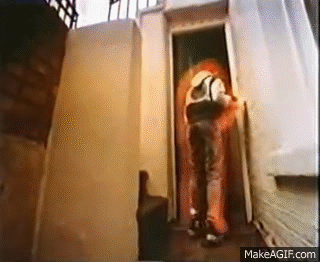Look
closely at my Berlin graph over there, the one with the 'x' axis
labelled money and 'y' axis reality. See it? Now,
you'll notice the graph line, declaring a gentle slope, running left
to right, and downwards. Definitely down.
Since
landing in Berlin about 8 weeks ago I've lived in a blissed-out state
of perpetual hyper-reality, where everything through my gleeful eyes
is exciting and immediate, drunkenly grinning at the shock of the new
with stupid, childish awe. I've spent two months floating around the
city ringed with a visceral golden glow.
Not unlike the Ready Brek kid. In fact, exactly like the Ready Brek kid.
Not unlike the Ready Brek kid. In fact, exactly like the Ready Brek kid.
 |
| Me, on an average day in Berlin |
But
the money I begged, borrowed and saved to make the Great Escape is
dwindling, pouring down the hungry drain of, mainly, booze and
furniture! A cold, sharp, grey light is quickly eviscerating the
fuzzy brilliance.
So,
I really only had one terrible option left; find a job.
Now,
my background and career (such that it is) has for the past decade
been spent in political campaigning and community/union organising.
So, a few weeks before moving, I emailed a bunch of excellent Berlin
union and Green Party (die Grünen) folk, friends of friends, with a
keen eye on seamlessly continuing my campaigning career (!) in my
new, progressive home.
And
there's the problem. Like someone peering over your shoulder and
pointing out the black '10' on the red Queen, I feel a bit silly for
only just realising.
Whereas a lot of the British in Berlin are
expanding stellar careers in online or digital technology, an
industry where English is pretty much the sole, shared language, my
background is in person-to-person campaigning, organising communities
and engaging with the political process at a grassroots level.
And
to organise people and communities, communication is pretty central;
communication, ideally, without the need for confusing hand gestures
and Google translate!
So,
of course, my plan was completely unrealistic. Did I really think I
could mooch on into Berlin, speaking not one word German, nor knowing one person, and expect a job in German politics to fall into my
lap? Of course not. Well, maybe a little bit of me closed its eyes
and wished really, really hard.
But, as part of the Berlin masterplan, in August 2014 I undertook
a month-long intensive TEFL (teaching English as a foreign language)
course, in order to give me an actual skill to exploit once here.
So
I arrived in Berlin, waving this TEFL qualification, clutched tightly
in my little hand, wondering which of the many English teaching
colleges in the city would be the lucky one to first offer me a job.
But, bewilderingly, the queue for my teaching services is as
remarkable in its absence as the offers from the Berlin political
world.
The
teaching career, I think, is going to take a while to build...
All
this is a round-the-houses way of saying that last week I started my
first part-time minimum wage job since I left casual employment over
10 years ago. You know. For a 'real' job!
My
wonderful flatmate took great pity on me and set me to work in the warehouse of
the children's clothing company he works for – Kirondo.
It
ain't a bad job – there are certainly much worse out there– and
I'm certainly very grateful. And, even working just 9-3, Monday to
Friday, on minimum wage, I think can pretty much live quite
comfortably in this cheapest of capital cities.
(By the way, paying minimum wage really is your boss letting you know that if they could pay you less, they definitely would!)
Working
part-time will also let me, in the afternoons, evenings and weekends,
build my teaching work and experience, which is very much what I
eventually would like to do in Berlin.
Brian Roberts is my role model, here.
Also,
importantly, if you earn over about 450 EURO a month here then your
employer is legally obliged to pay your health insurance (no NHS
here!).
So,
in the end, here's the upshot: I work with lovely people in a decent
enough job – where, importantly, not speaking German isn't much of
an issue - that lets me listen to 6 hours of new albums or podcasts
every shift, working part-time that gives me over half of each day to
myself to write and play, pays for my health insurance, while
allowing me to fairly comfortably live and booze in Berlin with
consummate elegance and depravity. Which, ultimately, was why I moved
here in the first place.
Turns out Jagger was right: you can't always get what you want, but, right now, I find I've got what I need.
Take it away, Mick.
Take it away, Mick.













